|
|
|
Sort Order |
|
|
|
Items / Page
|
|
|
|
|
|
|
| Srl | Item |
| 1 |
ID:
120772
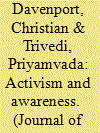

|
|
|
|
|
| Publication |
2013.
|
| Summary/Abstract |
There are a great number of outcomes for activism that are examined in the literature, but we know relatively little about how this behavior influences perceptions of the phenomena being challenged. It is possible that when one challenges some phenomenon, one begins to 'see' it more. Alternatively, activism might focus awareness on only certain manifestations of the problem of interest. The type of activism should matter here. We anticipate that only forms of resistance that increase exposure to oppression/oppressors and/or other challengers are likely to increase the number of discriminatory actions identified. Especially important here is nonviolent direct action because of the significant amount of training and interaction among activists that is facilitated by such activities as well as the extensive amount of exposure that nonviolence generally subjects participants to. Utilizing a unique database of 98,316 untouchables (or Dalits) from 1,589 rural villages in Gujarat, India, we find support for our argument. Specifically, Dalits who engaged in nonviolent action which increased either exposure to oppression/oppressors or exposure to other activists but not both, identified a higher number of discriminatory events. In short, some activism does activate some awareness. This has implications for dissident commitment, radicalization, and post-conflict political processes.
|
|
|
|
|
|
|
|
|
|
|
|
|
|
|
|
| 2 |
ID:
159383
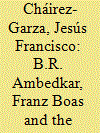

|
|
|
|
|
| Summary/Abstract |
This paper analyses Ambedkar's challenge to racial theories of untouchability. It examines how Franz Boas’ ideas about race, via Alexander Goldenweiser, influenced Ambedkar's political thought. Ambedkar is situated as a thinker aware of larger changes taking place in Western academia in the early twentieth century. During his time at Columbia University, Ambedkar familiarised himself with ideas that rejected the fixity of identities and racial hierarchies; following Boas, he rejected the idea that the untouchables’ place in society was determined by their supposed racial inferiority. Instead, he argued that untouchability was a cultural problem that could be stamped out.
|
|
|
|
|
|
|
|
|
|
|
|
|
|
|
|
| 3 |
ID:
164043
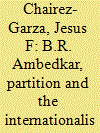

|
|
|
|
|
| Summary/Abstract |
This article analyses the way in which B.R. Ambedkar attempted to internationalise the problem of untouchability in the years prior to Partition. The move towards the international was an attempt to secure a political space for Dalits as a consequence of the Muslim League’s demand for Pakistan. Unable to reach an agreement with the likes of Gandhi and Jinnah, Ambedkar looked beyond India for support. His plight gained the attention of disparate people, including Winston Churchill, Jan Smuts and the members of the Indian Conciliation Group. By exploring these events, this article seeks to rescale the history of untouchability and Partition.
|
|
|
|
|
|
|
|
|
|
|
|
|
|
|
|
| 4 |
ID:
147382
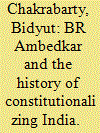

|
|
|
|
|
| Summary/Abstract |
BR Ambedkar is usually projected as a protagonist of social justice. But equally important was his role in constitutionalizing India, evident first in his witness to the 1919 Southborough Committee on Franchise, followed by his intervention in the 1930 Round Table Conference in London, where he defended compensatory discrimination for the untouchables in opposition to the Gandhi. The article argues that in so doing Ambedkar was evidently influenced by his teacher at the University of Columbia, John Dewey, who taught him the finer principles of liberalism. By comparing the views of Gandhi and Ambedkar on separate electorates and reservation, the article pursues the argument that unlike the former, Babasaheb sought to transform society through politics which, to him, meant the consolidation of constitutional values or endosmosis, or, to borrow George Grote’s expression, constitutional morality. On the basis of a thorough analysis of the principal arguments that he made to defend constitutional protection for compensatory discrimination, this article provides valuable insights showing the analytical basis of Babasaheb’s notion of social justice. Furthermore, his defence of liberal constitutional values also laid the foundation of a unique moral and political framework for public reasoning, a contribution that has not been adequately recognized in contemporary scholarship on Dalits, BR Ambedkar or social discrimination.
|
|
|
|
|
|
|
|
|
|
|
|
|
|
|
|
| 5 |
ID:
171295
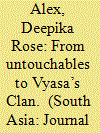

|
|
|
|
|
| Summary/Abstract |
This article examines the processes involved in the creation of a caste community called the Dheevaras in the South Indian state of Kerala in the early twentieth century. Although deemed an untouchable caste, the Dheevaras contested their untouchable status through various myths and histories, and this contestation was reflected in the Dheevara reform movement’s continuities with and departures from mainstream Hinduism and the caste system. While Dheevara reformers advocated a mainstream Hindu identity and claimed an honoured past for the community, they challenged Sanskritic Hinduism in defending the occupation of fishing. The reformers, however, strictly followed upper-caste Hindu patriarchal norms when imagining Dheevara womanhood, making women the bearers of caste honour.
|
|
|
|
|
|
|
|
|
|
|
|
|
|
|
|
| 6 |
ID:
178429
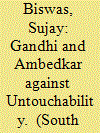

|
|
|
|
|
| Summary/Abstract |
This article challenges the false dichotomy, created in much of the existing historical and political analysis concerning the welfare programmes for ‘Harijans’ as put forward by Gandhi and Ambedkar, claiming that Ambedkar’s proposals were more progressive than Gandhi’s approach. The article draws on a detailed letter written by Ambedkar in 1932, proposing a programme of action that the Harijan Sevak Sangh should undertake for the welfare of ‘Harijans’. It compares this with the Constitution of the Harijan Sevak Sangh, drafted by Gandhi himself, to argue that the programmes of these two leaders actually show significant similarities in their intent and content concerning welfare measures for uplifting ‘Harijans’ in India, but seem to differ regarding strategies.
|
|
|
|
|
|
|
|
|
|
|
|
|
|
|
|
| 7 |
ID:
130172
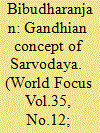

|
|
|
|
|
| Publication |
2014.
|
| Summary/Abstract |
As a practical social reformer, Gandhi noticed that inter-dining and inter-caste marriage are not going to abolish untouchability and inferiority among varnas exist. He strongly feels that the real cure lies in the change of heart. That is why, he was not enthusiastic about popularising these practices. To the questions whether inter-dining and inter-caste marriage are necessary for the removal of untouchability, his replay is both negative and affirmative. Negative because these are matters of individual concern and affirmative because, a person who refuses to take food touched by another on the plea inferiority, he is observing untouchability.
|
|
|
|
|
|
|
|
|
|
|
|
|
|
|
|
| 8 |
ID:
124974
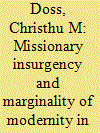

|
|
|
|
|
| Publication |
2013.
|
| Summary/Abstract |
This article argues that despite some efforts by early missionaries, Christians in India have continued to practise various forms of caste prejudice. The multi-dimensional understanding of caste made this issue heavily contested, dividing the Christian communities into two major components of marginal Christians, later known as Dalit Christians, and elite Christians constituting largely Nadars and Vellalas in South India. Despite considerable missionary misgivings about caste identities and resultant discriminations, traditional differentiation carried on and took new forms. This article traces these debates and shows the challenges of opposing caste-based discriminations that continue today.
|
|
|
|
|
|
|
|
|
|
|
|
|
|
|
|
| 9 |
ID:
129526
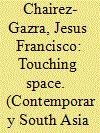

|
|
|
|
|
| Publication |
2014.
|
| Summary/Abstract |
Although B.R. Ambedkar, the chief architect of the Indian Constitution, is well known for his struggle against caste and the practice of untouchability, his ideas have seldom been linked to concepts such as nationalism or space. In an attempt to shed some light upon this under-explored subject, I analyse the relationship between the village, the city, the practice of untouchability and the emergence of nationalism in Ambedkar's thought. Focusing primarily on his writings, post 1935 concerning untouchability, I will argue that for Ambedkar, space played a critical role in both the perpetuation and evanescence of untouchability and similarly in the neglect and emergence of nationalism. More specifically, a small locus with tightly knit social and commercial associations, such as the Indian village, facilitated the ongoing differentiation of the population into two distinct groups, touchables and Untouchables. This social and spatial segregation perpetuated the practice of untouchability while preventing the growth of nationalism. However, a bigger and more crowded setting, such as the city, not only complicated the observance of social norms such as untouchability, but also benefited the creation of a corporate feeling of 'oneness' among individuals, which according to Ambedkar, was a condition for the emergence of nationalism.
|
|
|
|
|
|
|
|
|
|
|
|
|
|
|
|
|
|
|
|
|